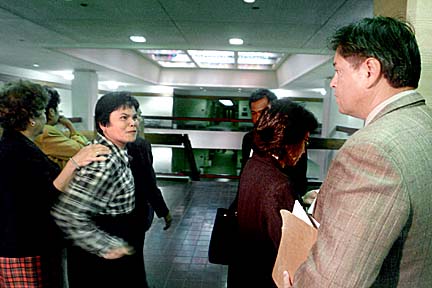


|
Salesman’s killer The family of a murdered vacuum cleaner salesman cried out in anguish yesterday after a Circuit Court judge announced that his killer was not guilty by reason of insanity.
ruled insane
The murder acquittal leaves
the victim's family in anguishBy Leila Fujimori
lfujimori@starbulletin.com"That's not fair!" screamed Rosalina Jacintho, sister of Melchor Tabag, who was killed, his body dismembered and disposed of by Michael Lawrence in 1999.
Circuit Judge Virginia Crandall said there was no dispute that Lawrence, 26, killed Tabag, and the state had proved second-degree murder.
But Crandall said the defense had proved Lawrence met the legal criteria for insanity: He suffered from a mental disease and, as a result, did not realize what he did was wrong, nor could he control his actions to comply with the law. She accepted the opinions of three psychiatrists who diagnosed Lawrence as schizophrenic and delusional.
Crandall reached her decision almost a year after the monthlong, jury-waived trial ended in May, and three years after the murder.

|
Because he poses a danger to others, she ordered Lawrence to be taken within 72 hours from the Oahu Community Correctional Center to the Hawaii State Hospital for custody, care and treatment.Tabag, whose body never has been found, had been demonstrating Kirby vacuum cleaners for Lawrence at the Waialua home on March 27, 1999.
Lawrence later admitted he struck the 41-year-old Tabag on the back of the head with a hammer, stabbed him and took his body to an isolated area, dismembered it and disposed of it at a refuse station.
The late verdict may have been due in part to the trial transcript not having been received until Oct. 25, the prosecutor said.
After the verdict was read, Lawrence asked Deputy Public Defender William Jameson what happened. Lawrence, wearing a red T-shirt and blue jeans, smiled after Jameson explained.
Jameson said that while he feels sorry for the Tabag family, "this was not an emotional type of verdict. It was done carefully and in accordance with the law.
"Michael is very ill," he said. "Every time I see Michael, it's that same silly grin. He has no comprehension this would have an impact on his life." He said Lawrence needs a therapeutic setting where he can receive treatment that he could not get at OCCC.
But Deputy Prosecutor Kevin Takata said, "I believe the facts of this case contradict the verdict."
Takata acknowledged Lawrence's mental illness but said the facts showed and experts testified that he could both conform his conduct to the law and knew what he was doing was wrong.
He said Lawrence had planned and concealed his actions by taking the body to an isolated area where he stripped and quickly dismembered it, knowing precisely where to cut, carefully placing the body parts in one dog food bag and putting the clothing in another, then taking it to the city dump.
Jameson had said during trial that Lawrence "had a fixed, powerful delusion that his mission on earth was to kill people and chop them up," and that his leaving a lot of evidence displayed his inability to distinguish right from wrong.
Takata said he felt the outcome would have been different had a jury decided the matter. "A defendant has the constitutional right to a jury trial (for a serious offense), but there's no constitutional right to a jury-waived trial," he said.
He would like to see a change where a jury-waived trial would need the prosecutor's permission.
Because Lawrence was acquitted, the state does not have the right of appeal.
Lawrence is not bound by any time limit he must be held at the Hawaii State Hospital.
"If, tomorrow, doctors say he presents no danger and has no mental disease, he can walk out the door," Takata said.
City Prosecutor Peter Carlisle said he would like to see Hawaii's liberal insanity law changed by dropping the defense that a defendant could not control his actions, leaving only the defense that the defendant could not distinguish right from wrong, as in other states.
"I'd like to see that for extreme emotional disturbance, which reduces murder to manslaughter," Carlisle added.
As for having a jury-waived trial over a bench trial, Carlisle said: "There's a tendency for juries to be less likely to buy it because it's a legalistic defense. Insanity is strictly a legal issue."
He said that is because of "wildly conflicting views" among psychologists and psychiatrists in this area.
The Tabag family's lawyer, Dennis Potts, said the death has been heart-wrenching for the family since there is no body, no grave and nowhere that they can place flowers.
"The son was the pillar of the family," he said.